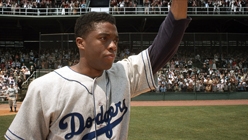This Monday, every player in Major League Baseball will wear the same number on his jersey: 42, which was Jackie Robinson’s number when, in 1947, he became the first black player in the majors, playing first base for the Brooklyn Dodgers.
Today, baseball celebrates April 15 as Jackie Robinson Day. But 66 years ago, not everyone saw his hiring as cause for celebration — and the earnestly grandiose biopic 42 means to illuminate that history-making moment, in which racial vitriol met its match in a ballplayer who let his talent do the talking.
Not without a struggle, of course. When Dodgers General Manager Branch Rickey (Harrison Ford, in a pitcher’s mound worth of makeup) tells a promising Negro League shortstop (Chadwick Boseman) that he’s hoping to hire him to play at Ebbets Field, he does not make shattering an eight-decade tradition of segregated baseball sound like it’ll be a walk in the park.
“People aren’t going to like this,” Rickey growls at the rookie by way of urging him not to take the bait when he gets baited. Better, says the GM: He should turn the other cheek and win by playing great ball.
The 26-year-old Robinson wants clarification — “You want a player who hasn’t got the guts to fight back?” — and gets it in almost the same words the real Jackie Robinson got when he played himself in the 1950 drama The Jackie Robinson Story: “No, I want a player who has the guts not to fight back.”


